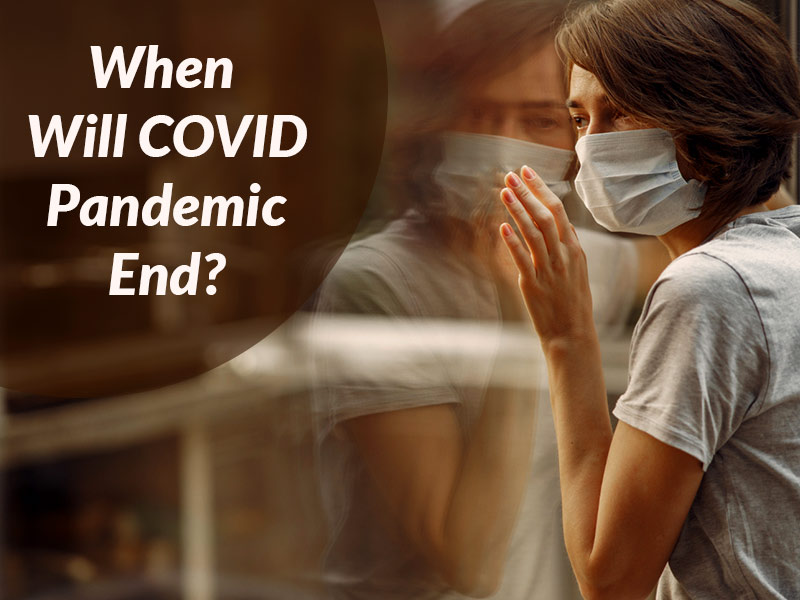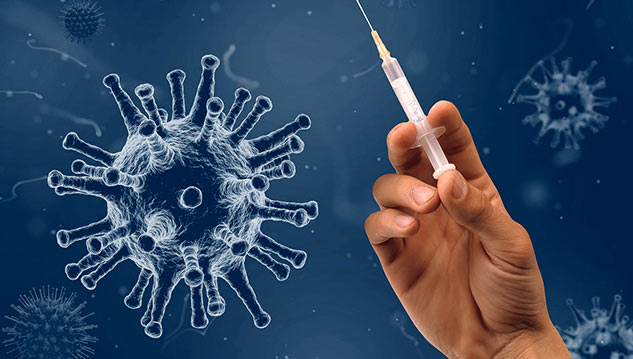
A virus that emerged in late 2019 in the central Chinese city of Wuhan swiftly took over the entire mankind. Over two years into the COVID-19 pandemic, the world has seen over 426 million coronavirus infections and 5.8 million deaths. Spanish flu (1918) was the last pandemic the world faced that gradually faded around 1920. So, what is the end for the pandemic caused by the novel coronavirus? Is virus endemicity near? Or the world will witness newer and deadlier variants? For answers to these questions, Onlymyhealth spoke to virologist Dr. Pavithra Gopalan and Dr. Arunesh Kumar, HOD & Senior Consultant, Pulmonology, Paras Hospitals, Gurugram. Let’s see what these experts said on how the COVID pandemic might pan out.
Table of Content:-
When Is A Pandemic Declared Having Ended?
Dr. Pavithra Gopalan: When you reduce the natural spread of the infection, you can say that the pandemic has ended. The 1918 Spanish flu, which came about and killed almost everyone who got infected, died down naturally as there was no vaccine. The number of people it could infect gradually came to an end. Hence, when the uncontrolled transmission comes to an end, we say that the disease is there and can spread, but it wouldn’t be a pandemic like it was.
Dr. Arunesh Kumar: The pandemic will end when the new infection cases will reduce and the population at large will develop immunity. It has happened in the past and might happen this time as well. However, we need to watch this space before concluding that the COVID pandemic has ended.
Also read: Too Many Covid Booster Shots Can Weaken Immune System, Say Experts
Delta Was A Long & Severe Wave. Omicron, Comparatively, Was Mild & Short. Is It Safe To Say COVID Is Reaching An Endemic Stage?

(Photo Credit: Pixabay)
Dr. Pavithra Gopalan: It is not safe to say at all that COVID is reaching an endemic stage. It is because there is no way to predict how the virus will mutate. Endemic means the disease is there, but it doesn’t cause fear. However, the same cannot be said about COVID as still we pay attention to COVID cases in the country, in our community, and in the rest of the world.
Dr. Arunesh Kumar: It could be that the virus is reaching an endemic stage. The mutational change in Omicron is a good sign. However, Omicron being mild is no confirmation that the coronavirus won’t mutate into lethal variants. Viruses mutate continuously for both good and bad. Omicron mutation can be seen as good, and as long as the trend continues, we can assume that the pandemic is close to getting over.
When Does A Disease Become Endemic?
Dr. Pavithra Gopalan: Endemic means that the disease is constantly around. However, you are not worried about it.
Dr. Arunesh Kumar: Herd immunity does certainly play a role here. It happens either by mass vaccination or mass infection. Presently, it is too soon to say that the COVID-19 has become endemic. But, as long as the tone remains the same, we can say that the pandemic is wavering off.
Also read: Obesity Increases Risk Of Death Due To COVID: Study
Is There A Possibility Of Any Future COVID Waves?

(Photo Credit: Pixabay)
Dr. Pavithra Gopalan: Yes, because we don’t know how the virus will mutate and spread. It can turn into anything, lethal and virulent, mild and virulent, lethal and less transmissible, and mild and transmissible. There is no way to predict. Hence, it is very important to get vaccinated.
Dr. Arunesh Kumar: Yes, it is possible. Newer variants will depend on new infections. As COVID norms are being eased across the world, fewer people are likely to wear masks and practice social distancing. It gives a way for new infections and newer variants, which can bring about another wave.
What Factors Play A Role In Virus Mutations?
Dr. Pavithra Gopalan: Whenever a virus mutates, there is a change in its genome. Several factors can play a role here, such as vaccination. In a hypothetical scenario, let us assume unvaccinated individual contracts the coronavirus. Since he is unvaccinated, the virus replicates rapidly in his body. Let us assume it replicates 1,000 times. In this case, there is a chance of 1,000 different mutations, which can be both mild and lethal. In a vaccinated person, on the other hand, the body responds promptly to infections, controlling the replication of the virus. Hence, there is a lesser chance of mutations.
Dr. Arunesh Kumar: New infection is a factor. Vaccine inequality is another. Many western countries have covered their entire population, while the same cannot be said for poorer countries. Vaccine inequality paves the way for new infections, which, in turn, lead to new mutations. Hence, there is a need to follow COVID-appropriate norms even if the infections come down and the disease becomes endemic.
Will There Be A Need For Changes In The Current COVID Vaccines?
Dr. Pavithra Gopalan: If you take a generalised vaccine, like Covaxin, there is a greater probability of it being effective against newer variants, as compared to vaccines developed by Pfizer and Moderna that target the specific parts. It is because when the whole virus is introduced, the body generates antibodies against different parts of it. Hence, when the virus attacks, there are antibodies at least against some portions of it. It might not be the case with Pfizer and Moderna, in which the body might take longer to respond to the virus.
Dr. Arunesh Kumar: Yes, changes in the current COVID vaccines might be needed. For example, the influenza shots need to be updated almost twice a year based on the variant in circulation. And COVID is no exception. Hence, the vaccines might need to be updated, which might happen in the coming days.
Is The End Of COVID Pandemic Anywhere Close?
Dr. Pavithra Gopalan: We cannot eradicate COVID-19 from the face of the earth. We have to live with it and cope with whatever mechanisms are available, such as masking, social distancing, getting vaccinated, etc.
Dr. Arunesh Kumar: The number of new cases is dipping. If the trend continues, the disease might turn endemic. However, it is too soon to say, and we need to watch this space before concluding anything.
Hence, the COVID pandemic might stay for some more time. Our conduct during this period will play a major role in determining in which direction it will pan out. By getting vaccinated, wearing masks, practicing social distancing, and taking care of hand hygiene, we can control the virus transmission to a great extent. However, if we ignore the COVID-appropriate norms, it can pave the way for the virus to travel fast, spread rapidly, and mutate into dangerous variants. Hence, as long as we are living amid a pandemic, follow the COVID norms, get vaccinated, and protect yourself and your family from this lethal disease.
(With inputs from virologist Dr. Pavithra Gopalan and Dr. Arunesh Kumar, HOD & Senior Consultant, Pulmonology, Paras Hospitals, Gurugram)
Photo Credit: Freepik
Also watch this video
How we keep this article up to date:
We work with experts and keep a close eye on the latest in health and wellness. Whenever there is a new research or helpful information, we update our articles with accurate and useful advice.
Current Version